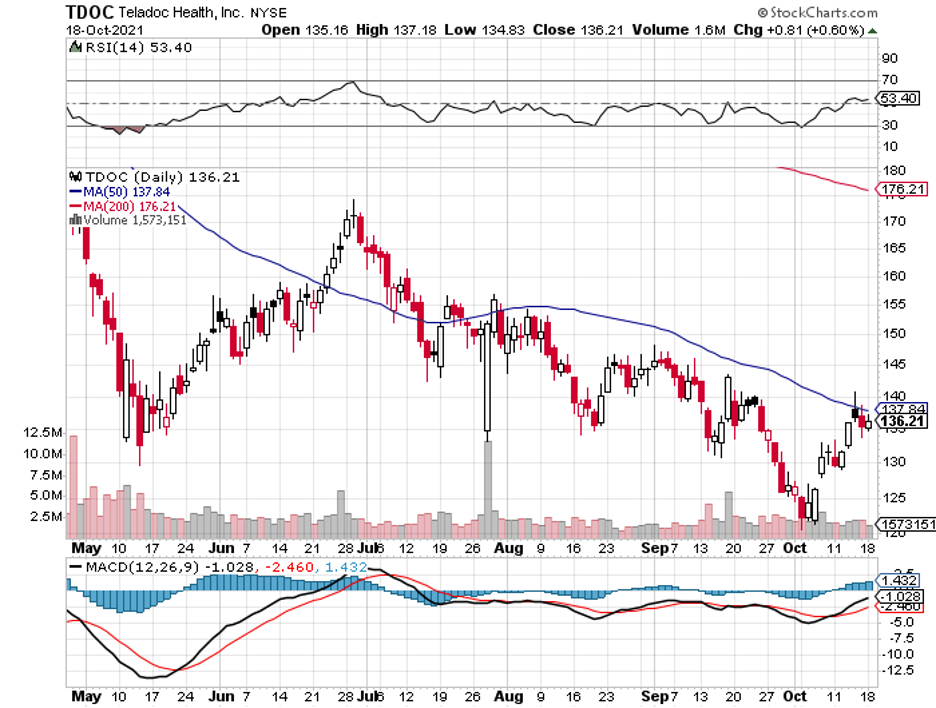An Anytime, Anywhere Healthcare Stock
Following massive gains at the onset of the COVID-19 pandemic, several healthcare growth stocks have fallen a long way from their highs.
In fact, some high-quality names have become potential bargains due to the market's recent negative turn.
In this situation, we can apply Warren Buffett’s advice: "We simply attempt to be fearful when others are greedy and to be greedy only when others are fearful."
That is, I think it might just be the time to be a bit greedy.
One of the companies affected by the massive pullback is Teladoc (TDOC).
Over the past 1.5 years, Teladoc has been on a rollercoaster ride when it comes to its price action.
Initially, the stock was regarded as merely a COVID-19 pandemic play with limited growth in the future.
Because of that perception, Teladoc's price started to drop the moment the people got their vaccine shots.
Some investors believe that when things go back to normal, the whole telehealth industry will become pointless.
I don't think that's the case.
I believe that digital medicine and the presence of virtual health services will become mainstays in our lives—and Teladoc is in an enviable position as one of the pioneers in this disruptive industry that's only starting to take on the healthcare system by storm.
When the pandemic started, it was nearly impossible for most people to gain access to healthcare.
Most patients were scared to travel to the doctor for consultations, causing them to cancel and postpone appointments.
What Teladoc offered is to turn the impossible possible for several patients who needed access to their healthcare providers—and its efforts were rewarded in spades.
In 2019, Teladoc reported $553 million in total revenue, increasing by 32% from its 2018 earnings.
By 2020, the business exploded to reach a whopping $1.09 billion, showing a massive 98% growth year-over-year. Moreover, visits and consultations skyrocketed by 206%.
To hold on to its lead, Teladoc has been working hard to bolster its competitive positioning. It seized a blockbuster acquisition and bought Livongo for $18.5 billion in cash and stock.
Adding Livongo to its portfolio means cornering the market on remote monitoring for patients suffering from chronic diseases.
This addition to its business not only expands Teladoc's business, but also opens a massive addressable market worth $50 billion to the company.
Teladoc can leverage this vast network through cross-selling products and services, thereby creating the Amazon (AMZN) of the healthcare world—a platform with an unbeatable ecosystem and an irresistible value proposition.
Since the merger, the two companies have developed a full-person digital healthcare platform called Primary360.
Meanwhile, Teladoc's growth story carries on, with the total revenue for 2021 already approaching the $2 billion mark.
This signifies an impressive 84% increase on top of the company's COVID-19-induced spurt.
As for 2022, Teladoc is projected to grow at a conservative 29%.
Despite the impressive growth of Teladoc, the company has barely scraped the surface.
Overall, the virtual care market is estimated to be worth $250 billion annually. Although Teladoc holds the most significant share thus far, it's evident that it has less than 1% of the market share.
In fact, the telemedicine industry is projected to be valued at half a trillion dollars globally by 2030.
Considering that Teladoc's yearly revenue thus far is sitting at only $2 billion, the company definitely has a lucrative growth runway in the coming 9 years.
In 2020, its stock price roughly tripled from being under $100 to reaching $300. Recently, though, Teladoc's price has gone down to approximately $130.
Given its obvious room for growth, I say this stock is undervalued. So, investors are granted the chance to add this company to their portfolio at a relatively low price.
With the massive market potential of this industry, it comes as no surprise that Teladoc now faces intense competition in the field.
The strongest rivals of the company in the telehealth segment include Amwell (AMWL), Walmart (WMT), Hims and Hers Health (HIM), and even Amazon.
With the market's sheer size, though, the situation doesn't seem to be a winner-takes-all type.
The space is definitely massive enough to support more than one telehealth company.
However, Teladoc does have the advantage as the first mover. It also has its impeccable partnership with Livongo, making it an anytime-anywhere-healthcare service.
So far, I can say that Teladoc is off to an excellent start in a rapid growth segment. I especially appreciate the company's goal to disrupt the medicine and healthcare space—a field that is in dire need of a revolution to eliminate the debilitating costs and crippling inefficiencies.
More than that, I think Teladoc is becoming instrumental in boosting the reach of the most effective medical professionals and offering a remarkable platform to promote artificial intelligence innovation in healthcare.
Ultimately, this will help enhance the quality of healthcare received by patients.
When looking at disruptive technologies, I always say that it's best to invest in companies working to shape the future.
This goal is typically a surefire way to make money in the long run, and Teladoc perfectly suits the description.


